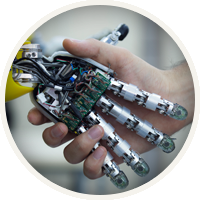
Want a job whose alternate title could be magician? Add biochemical engineer to your "possible careers" list. These whizzes take instructions written by biologists or chemists and figure out how to turn them into real-life products, often working in a lab with raw materials such as cells, bacteria, or yeast. Your morning yogurt, the cold medicine you take when you're sick, and garden fertilizer are all things that couldn't have been created without the help of biochemical engineers. Along with a bachelor's degree in engineering, you'll also need work experience like a research internship, and possibly a master's degree or PhD if you want to compete for higher-paying jobs with the government or at large research firms. Once they're hired, biochemical engineers are expected to keep studying new technology and may be expected to publish papers about their own projects. (So, definitely no phoning it in once you land the job, basically…)
The Details
Master's Degree
Biochemical engineers help further major medical advances: For example, they might be responsible for growing large numbers of cells that are then used to test cancer-fighting drugs, or formulating new, lifesaving medications.
Before becoming a supermodel, Cindy Crawford graduated valedictorian of her high school class and won a scholarship to Northwestern University to study chemical engineering.






